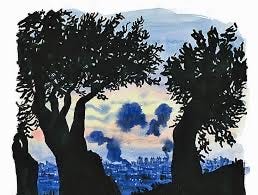In the hopelessness that comes with watching what is happening in Gaza, in the knowing that there is nothing I can do, in the turning away from the TV screen because the images are too awful to countenance, I have found some solace in reading poetry from Palestine… To Our Land, (Below) is by Mahmoud Darwish, (1942-2008) often referred to as the national poet of Palestine.
‘Darwish was born in al-Birwa in Galilee, a village that was occupied and later razed by the Israeli army. Because they had missed the official Israeli census, Darwish and his family were considered “internal refugees” or “present-absent aliens.” Darwish lived for many years in exile in Beirut and Paris. He is the author of over 30 books of poetry and eight books of prose, and earned the Lannan Cultural Freedom Prize from the Lannan Foundation, the Lenin Peace Prize, and the Knight of Arts and Belles Lettres Medal from France.’ Poetry Foundation website.
To Our Land
To our land,
and it is the one near the word of god,
a ceiling of clouds
To our land,
and it is the one far from the adjectives of nouns,
the map of absence
To our land,
and it is the one tiny as a sesame seed,
a heavenly horizon ... and a hidden chasm
To our land,
and it is the one poor as a grouse’s wings,
holy books ... and an identity wound
To our land,
and it is the one surrounded with torn hills,
the ambush of a new past
To our land, and it is a prize of war,
the freedom to die from longing and burning
and our land, in its bloodied night,
is a jewel that glimmers for the far upon the far
and illuminates what’s outside it ...
As for us, inside,
we suffocate more!
BY MAHMOUD DARWISH
TRANSLATED BY FADY JOUDAH
Some other lesser known poets featured here, I particularly love, The Carob Tree
Thanks for reading - (the arm and shoulder are improving - short bursts on keyboard, but no more!) Avril x


Thank you Avril, for an introduction to a writer whose name is new to me.
Thank you for sharing this, and for the link to more. I am flinching from the horrors, too, but conscious that I must not look away completely, so (perhaps hoping to comprehend the incomprehensible) I am reading A Day in the Life of Abed Salama by Nathan Thrall (2023, published only days before the outbreak of the present war), and planning to read Colum McCann's Apeirogon (2020) next. As you probably know, both are centred on fact — Thrall's a work of reportage, McCann's a novel about real people — and highly-regarded for their balance and nuance. But it's good to hear Palestinian voices at first hand, as with this intrinsically emotive poetry. Also, I believe McCann references Mahmoud Darwish (a name completely new to me) in his novel, and I appreciate the approaching symmetry of that.